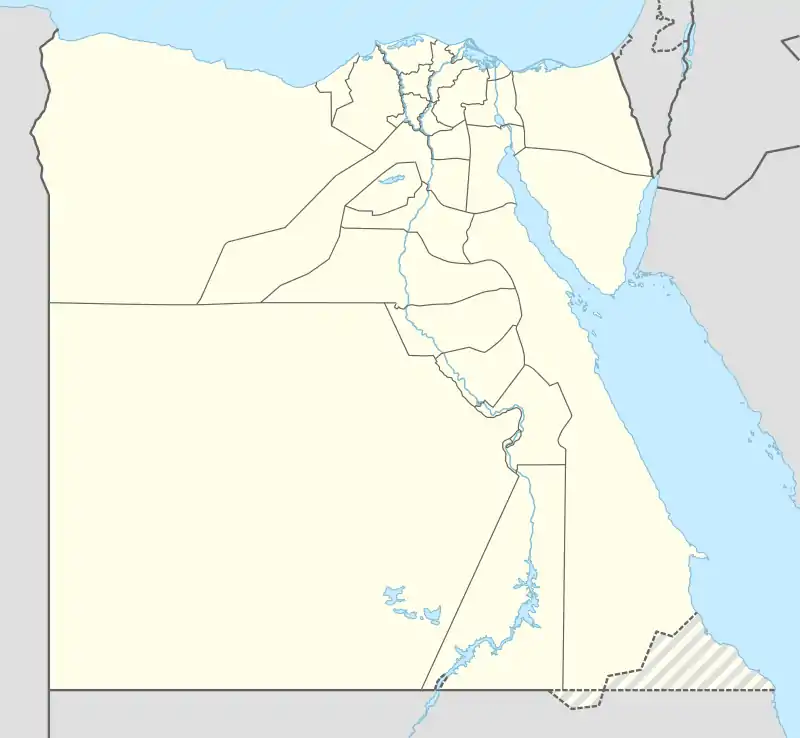Abu Suweir Air Base | |||||||||
|---|---|---|---|---|---|---|---|---|---|
| Ismaïlia, Ismailia Governorate in Egypt | |||||||||
 Abu Suweir Air Base Shown within Egypt | |||||||||
| Coordinates | 30°34′20″N 032°05′45″E / 30.57222°N 32.09583°E | ||||||||
| Site information | |||||||||
| Owner | Egyptian Armed Forces | ||||||||
| Operator | Egyptian Air Force | ||||||||
| Site history | |||||||||
| Built | 1942 | ||||||||
| In use | 1942-present | ||||||||
| Airfield information | |||||||||
| Elevation | 14 metres (46 ft) AMSL | ||||||||
| |||||||||
Abu Suweir Air Base is an Egyptian Air Force (Arabic: القوات الجوية المصرية, El Qūwāt El Gawwīyä El Maṣrīyä) base, located approximately 17.1 kilometres (10.6 mi) west of Ismaïlia and 116 kilometres (72 mi) northeast of Cairo. It is positioned for strategic defence of the Suez Canal waterway.
Second World War and Suez Crisis
During the Second World War the airfield, then known as RAF Abu Sueir or Abu Sueir Airfield (LG-205) was used as a military airfield by the Royal Air Force of the United Kingdom and the American United States Army Air Forces during the North African Campaign against Axis forces.
USAAF Ninth Air Force units which used the airfield were:[1]
- 376th Bombardment Group, 8 November 1942-January 1943, Consolidated B-24 Liberator
- 512th Bombardment Squadron, 9 November 1942-10 February 1943
- 513th Bombardment Squadron, 8 November 1942-10 February 1943
- 514th Bombardment Squadron, 8 November 1942-10 February 1943
- 515th Bombardment Squadron, 8 November 1942-6 February 1943
Royal Air Force units:
- No. 6 Squadron RAF, No. 13 Squadron RAF, No. 37 Squadron RAF, No. 40 Squadron RAF, No. 46 Squadron RAF, No. 70 Squadron RAF, No. 80 Squadron RAF, No. 84 Squadron RAF, No. 89 Squadron RAF, No. 104 Squadron RAF, No. 114 Squadron RAF, No. 145 Squadron RAF, No. 208 Squadron RAF, No. 213 Squadron RAF, No. 214 Squadron RAF, No. 216 Squadron RAF, No. 223 Squadron RAF, No. 252 Squadron RAF, No. 272 Squadron RAF, No. 450 Squadron RAF, No. 458 Squadron RAF[2]
In the mid-1950s, the base was the last station to be handed over by the RAF to the Egyptians. This was despite the fact that Abu Sueir and Fanara were the two bases to be retained, to be maintained by civilian contractors.
The main body of 2nd Battalion Grenadier Guards, the last British Army fighting unit remaining in Middle East Land Forces amid the Suez Crisis, left on 24-25 March 1956 by ship; they had been located at Golf Course Camp in Port Said. The last remaining rear-guard company of the battalion left by air on 2 April 1956 from Abu Sueir.[3]
Abu Sueir was handed over to Egypt on 14 April 1956.[4]
Twenty-first century
Today, the airfield is an active Egyptian Air Force Base. Its Second World War configuration is still evident in aerial photography. It houses the 60th Tactical Fighter Squadron of the 262nd Tactical Fighter Wing, flying General Dynamics F-16C/D Block 40s Fighting Falcons.[5]
See also
References
- ↑ Maurer, Maurer. Air Force Combat Units of World War II. Maxwell AFB, Alabama: Office of Air Force History, 1983. ISBN 0-89201-092-4; Maurer, Maurer, ed. (1982) [1969]. Combat Squadrons of the Air Force, World War II (PDF) (reprint ed.). Washington, DC: Office of Air Force History. ISBN 0-405-12194-6. LCCN 70605402. OCLC 72556.
- ↑ Jefford 1988, p. 153.
- ↑ "British Army units from 1945 on - 2nd Battalion Grenadier Guards".
- ↑ David Lee (RAF officer), Wings in the Sun, pp49-50.
- ↑ Scramble.nl
- Bibliography
- Jefford, C. G. (1988). RAF Squadrons. A comprehensive record of the movement and equipment of all RAF squadrons and their antecedents since 1912. Shrewsbury: Airlife. ISBN 1-85310-053-6.
.svg.png.webp)